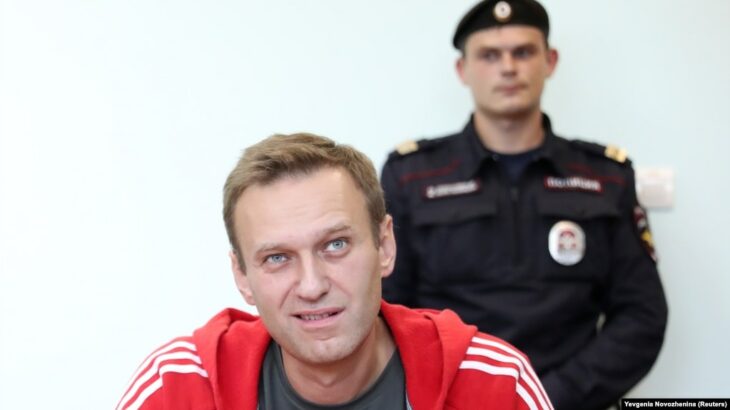
MOSCOW – Imprisoned Russian opposition leader Aleksei Navalny has expressed “pride and hope” after nationwide demonstrations calling for his release amid reports his health is deteriorating.
In a post to Instagram on April 22, Navalny called the thousands of Russians who took to the streets the previous day “the salvation of Russia.”
Russian police detained more than 1,700 people during the rallies, including at least 10 journalists, in what Amnesty International described as being part of “shocking crackdown on basic freedoms.”
Navalny, 44, has been in custody since January. He has been on hunger strike since March 31 to demand that doctors treat him for severe pain in his back and legs.
In a statement published on the Mediazona website, Navalny’s doctors urged him to end the hunger strike, saying that if it “continues even a little longer, we will simply no longer have a patient to treat.”
Meanwhile, the Parliamentary Assembly of the Council of Europe (PACE) called on Russia to release Navalny “immediately and in any event before the next ‘human rights’ meeting of the Committee of Ministers in June 2021.”
Pending his release, President Vladimir Putin’s most-vocal critic should be provided with “all necessary medical care, including examination and treatment by a doctor of his choice, and to ensure that his rights under the European Convention on Human Rights and domestic law are fully respected,” according to a PACE resolution, which was backed by 105 parliamentarians during a session of the assembly in Strasbourg.
At total of 26 lawmakers from Russia, Azerbaijan, and Armenia voted against the resolution. Those who abstained included representatives from Turkey, Serbia, and one from the Czech Republic.
Thousands of Russians from Vladivostok in the Far East to Kaliningrad on the Baltic Sea joined the April 21 protests called by leaders of Navalny’s Anti-Corruption Foundation (FBK), who fear the Kremlin critic be harmed “irreparably” if he doesn’t get adequate medical treatment.
OVD-Info, which monitors the detention of political protesters and activists, reported more than 1,700 detentions across the country, with about half the detentions in St. Petersburg, in what Amnesty International described as being part of a “shocking crackdown on basic freedoms.”
Police detained at least 10 journalists and harassed others in in connection with their coverage of the protests, according to media freedom watchdogs.
The number of protesters appeared smaller than previous rallies organized by Navalny’s team amid a heavy police presence, a roundup of his allies early in the day, threats of arrest, and the closure of key meeting spots.
“There was less police violence and brutality on April 21 compared with the January and February pro-Navalny protests, but the authorities’ continued clampdown on freedom of assembly is wholly unjustified,” said Damelya Aitkhozhina, a Russia researcher with Human Rights Watch (HRW).
“The authorities are quick to allege that without police interference so-called ‘unauthorized’ gatherings become violent, but the April 21 protests showed how baseless that allegation is.”
Natalia Zviagina, Amnesty International’s Moscow office director, said that, in many cities, the authorities arrested protesters “en masse, often using excessive force” such as in St. Petersburg, where police “used tasers indiscriminately and in several instances beat detained protesters.”
The authorities’ “attempts to trample dissent into dust are growing increasingly desperate — from the ongoing detention of Navalny and the effort to ban his movement by branding it ‘extremist,’ to the violent targeting and mass arrest of his supporters,” she added.
“There are simply not enough jail cells to lock up and silence every critical voice in Russia.”
Gulnoza Said, the Committee to Protect Journalists’ Europe and Central Asia program coordinator, said Russian law enforcement “should ensure that journalists can do their jobs safely, and not resort to detention and harassment to interfere with coverage of events of national interest.”
Russia ranks 150th out of 180 countries in Reporters Without Borders’ 2021 World Press Freedom Index.
The nationwide demonstrations came just days after the Moscow Prosecutor’s Office asked a court last week to label as “extremist” three organizations tied to Navalny — the FBK, the Citizens’ Rights Protection Foundation, and Navalny’s regional headquarters.
Prosecutors claim the organizations are “engaged in creating conditions for destabilizing the social and sociopolitical situation under the guise of their liberal slogans.”
The FBK has rattled the Kremlin over the years with its video investigations exposing the unexplained wealth of top officials, including Putin.
The prosecutor’s request comes ahead of crucial parliamentary elections later this year, in which Navalny’s organizations are seeking to organize citizens to vote against the ruling United Russia party at a time its ratings have tumbled amid growing frustration over eroding living standards.
Navalny was arrested on January 17 upon his return to Russia from Germany, where he received life-saving treatment for the poisoning attack in Siberia in August.
He has insisted that his poisoning with a Soviet-style chemical nerve agent was ordered directly by Putin. The Kremlin has denied any role in the incident
.In February, a Moscow court ruled that, while in Germany, Navalny had violated the terms of parole from an old embezzlement case that is widely considered to have been politically motivated.
Navalny’s 3 1/2-year suspended sentence from the case was converted to a prison term, though the court said he will serve 2 1/2 years in prison given time already served in detention.
The activist, who had been serving his term in a notorious prison about 100 kilometers east of Moscow before being transferred on April 18 to a prison with better medical facilities in the same region, went on a hunger strike three weeks ago to protest the inadequate medical treatment he has received while in detention.
Russian human rights commissioner Tatyana Moskalkova was quoted by the RIA Novosti news agency as saying four doctors from outside Russia’s Federal Penitentiary Service (FSIN) visited Navalny in the prison on April 20 and found no serious health problems.
In a letter to Council of Europe Secretary-General Marija Pejcinovic Buric, Moskalkova asserted that Navalny’s prison conditions and medical treatment were in compliance with international standards, Russian state media reported.
However, that assessment runs contrary to a letter to the FSIN last week by Anastasia Vasilyeva, Navalny’s personal physician, and three other doctors, including a cardiologist, who said the opposition leader’s health was rapidly deteriorating and his potassium count had reached a “critical level,” meaning “both impaired renal function and serious heart rhythm problems can happen any minute.”
U.S. lawmakers later on April 21 introduced a bipartisan resolution condemning the poisoning, “wrongful imprisonment and brutal treatment” of Navalny.
The United States and the European Union have already imposed sanctions on Russia for Navalny’s poisoning.
His supporters are now calling on the West to impose new sanctions on Moscow for its treatment of the opposition leader.




